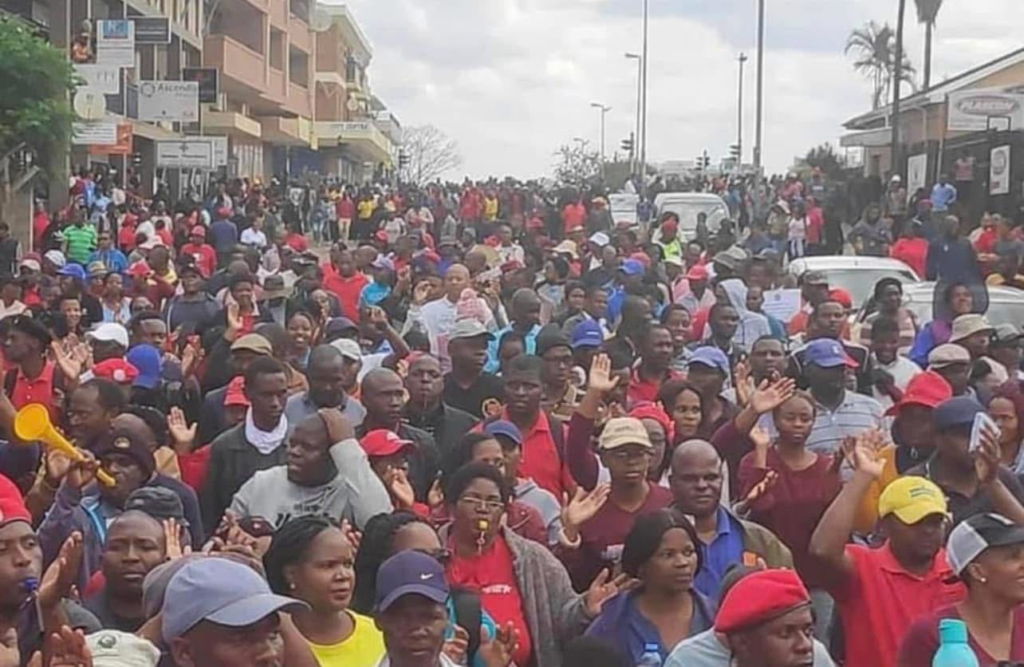ESCALATING RESTRICTIONS: GOVERNMENT BLOCKS PROTESTS AS POVERTY DEEPENS

The Eswatini government’s continued suppression of public protests has drawn sharp criticism from citizens and leaders alike. Mduduzi Gina, Secretary General of the Trade Union Congress of Swaziland (TUCOSWA), recently condemned the government’s escalating restrictions on citizens’ right to protest, describing them as deliberate attempts to silence dissent and block legitimate demands for justice and accountability.
Gina’s remarks follow the abrupt cancellation of a planned protest aimed at delivering a petition to Parliament. The protest, organized to oppose proposed increases in electricity and water tariffs, was halted by King Mswati’s sister, Regional Administrator Princess Tsandzile. Despite TUCOSWA’s compliance with the Public Order Act and formal notification of authorities, the march was blocked, further illustrating the regime’s efforts to sabotage legitimate expressions of public frustration.
“But it seems in this country all legitimate efforts for the citizens to protest and even petition Parliament are sabotaged by the authorities,” Gina stated, highlighting the government’s consistent use of power to undermine citizens’ rights.
The planned protest was a response to the looming tariff hikes on essential utilities like electricity and water—an increase that would push already struggling citizens deeper into poverty. The rising costs of these basic commodities are expected to trigger further inflation, making it even harder for ordinary Swazis to afford food, healthcare, and other necessities. For many, the government’s decision to block a peaceful demonstration underscores its disconnection from the hardships faced by the people.
Efforts to question Regional Administrator Princess Tsandzile about the protest’s cancellation were deflected. Instead of addressing concerns about the protest, she redirected attention to the Incwala ritual ceremony, leaving questions unanswered. Such evasive responses have become emblematic of the monarchy’s disregard for accountability and its preference for preserving tradition over addressing pressing socio-economic issues.
Eswatini’s political landscape has long been defined by its absolute monarchy, where public dissent is treated as a threat to the regime. The June 2021 crackdown, during which King Mswati allegedly deployed soldiers, police, correctional officers, and mercenaries to suppress calls for democratic reform, remains a stark reminder of the risks faced by those who speak out. Dozens of civilians lost their lives during the violent repression, and many more were injured or detained.
Blocking protests and silencing voices of dissent have become routine strategies for the regime. Citizens seeking to petition Parliament or highlight grievances are routinely met with roadblocks, harassment, or outright bans. These restrictions not only violate fundamental human rights but also exacerbate the growing divide between the monarchy and the people.
For ordinary Swazis, the proposed tariff hikes represent yet another blow in a long series of economic hardships. As living costs continue to rise, wages stagnate, and unemployment remains high, frustration is mounting. The government’s refusal to allow protests adds to the sense of hopelessness among citizens, who feel increasingly alienated and powerless in the face of a regime that prioritizes its survival over their well-being.
TUCOSWA and other civil society groups remain steadfast in their commitment to advocating for workers’ rights and democratic reforms. Despite the government’s attempts to stifle dissent, these organizations continue to mobilize and speak out against injustices. Their resilience is a testament to the growing demand for change in Eswatini, even under the shadow of repression.
The international community must recognize the escalating restrictions in Eswatini and support the fight for justice and accountability. Advocacy organizations and global allies can amplify the voices of Swazis and pressure the monarchy to uphold citizens’ rights to peaceful protest and assembly.
Eswatini’s path forward requires systemic change. The government’s efforts to suppress protests will not erase the deep-seated frustrations of its people, nor will they address the underlying issues of poverty, inequality, and oppression. The voices of ordinary Swazis, demanding dignity and fairness, will only grow louder. The question is not whether change will come but how long the monarchy can resist before the will of the people prevails.




This blog is nothing but propaganda to destabilize the country. Thulani, stop pretending to care about Swazis when your goal is to undermine our leadership.
Why do you always side with protesters and never with the government? The King knows what’s best for Eswatini. You’re sowing division with your biased reporting.
Brilliant piece, Thulani! You’ve articulated what many of us feel but cannot say out loud. It’s time the government starts prioritizing its people over rituals and ceremonies. The resilience of TUCOSWA and other civil groups inspires hope, and your coverage keeps the spotlight on their efforts.
This blog is just another attempt to tarnish the monarchy’s reputation. Thulani, stop spreading negativity—our traditions and the King are what keep this nation together. You’re always focused on tearing down the government instead of acknowledging the challenges of running a country. Criticism without solutions is just noise